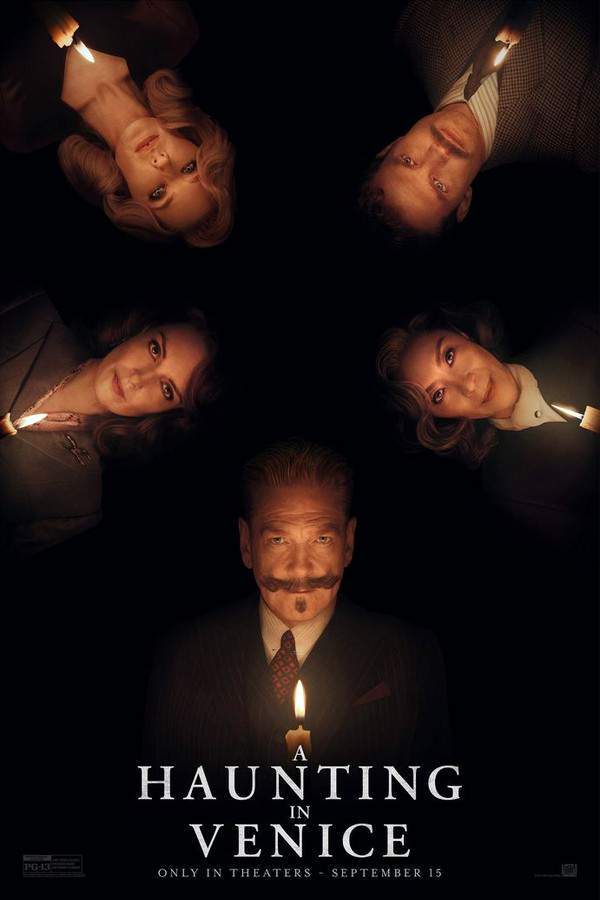A Haunting in Venice 2023

A renowned, retired Hercule Poirot is reluctantly pulled back into the world of crime when a sinister murder occurs during a bizarre seance in Venice. Held within a decaying palazzo cloaked in fog, Poirot must navigate a complex investigation filled with deceit and long-held secrets. As he explores the unsettling events, he is forced to face his own inner demons and confront the mysterious forces at play, threatening everyone present.
Does A Haunting in Venice have end credit scenes?
No!
A Haunting in Venice does not have end credit scenes. You can leave when the credits roll.
Meet the Full Cast and Actors of A Haunting in Venice
Explore the complete cast of A Haunting in Venice, including both lead and supporting actors. Learn who plays each character, discover their past roles and achievements, and find out what makes this ensemble cast stand out in the world of film and television.

Michelle Yeoh
Joyce Reynolds

Tina Fey
Ariadne Oliver

Riccardo Scamarcio
Vitale Portfoglio

Amir El-Masry
Alessandro Longo

Kelly Reilly
Rowena Drake

Jamie Dornan
Dr Leslie Ferrier

Camille Cottin
Olga Seminoff

Jude Hill
Leopold Ferrier

Dylan Corbett Bader
Baker

Fernando Piloni
Vincenzo Di Stefano

Lorenzo Acquaviva
Grocer

David Menkin
Puppet Show MC

Yaw Nimako-Asamoah
Child (Cookie Gobbler)

Clara Duczmal
Child (Crying Girl)

Rowan Robinson
Alicia Drake

Emma Laird
Desdemona Holland

Stella Harris
Child (Staircase 1)

Emilio Villa-Muhammad
Child (Staircase 2)

Vanessa Ifediora
Sister Maria Felicitas
External Links and Streaming Options
Discover where to watch A Haunting in Venice online, including streaming platforms, rental options, and official sources. Compare reviews, ratings, and in-depth movie information across sites like IMDb, TMDb, Wikipedia or Rotten Tomatoes.
Ratings and Reviews for A Haunting in Venice
See how A Haunting in Venice is rated across major platforms like IMDb, Metacritic, and TMDb. Compare audience scores and critic reviews to understand where A Haunting in Venice stands among top-rated movies in its genre.

The Movie Echo Score
Overall, A Haunting in Venice delivers a visually rich and atmospherically engaging experience, though its narrative momentum occasionally stumbles. Critics praised the film’s sumptuous set pieces and evocative performances, while many viewers highlighted the intriguing mystery and satisfying conclusion. However, a handful of reviews pointed to a somewhat predictable plot and uneven pacing that limit its impact. Despite these reservations, the film’s gothic flair and solid ensemble work combine to create a compelling entry in Branagh’s series, leaving a generally favorable impression.
The Movie Echo Score Breakdown for A Haunting in Venice

Art & Craft
In terms of art and craft, A Haunting in Venice shines with its lavish production design and precise visual composition. The film’s depiction of decaying Venetian palaces and elaborate gothic set pieces establishes a palpable sense of place, while frequent Dutch angles and refined cinematography underscore its stylistic ambitions. These elements form a visually compelling backdrop throughout.

Character & Emotion
In terms of character and emotion, performances are consistently evocative with particular note for Branagh’s nuanced Poirot. The ensemble cast delivers measured portrayals, lending depth to interpersonal dynamics amid gothic overtones. Although some roles offer limited development, the actors’ chemistry and emotion-driven moments convey sufficient resonance. Overall, the character work grounds the narrative effectively.

Story & Flow
In terms of story and flow, the film presents an intriguing mystery punctuated by atmospheric twists. Reviews highlight the satisfying revelation and the film’s homage to classic detective structure, though some criticism notes predictable beats and uneven pacing. While the narrative occasionally stalls in exposition, overall the plot maintains enough engagement and originality to hold interest.

Sensory Experience
In terms of sensory experience, the film excels in crafting a moody ambiance through its soundtrack and sound design. Critics and viewers alike remark on the restrained score that drifts as a haunted echo, complementing creaking floorboards and distant murmurs. Paired with a cohesive color palette and strategic lighting, these elements heighten the immersive gothic atmosphere.

Rewatch Factor
In terms of rewatch factor, the film offers moderate appeal for subsequent viewings thanks to its atmospheric details and subtle clues. Viewers may find new appreciation in recurring visual motifs and the breadcrumb trail of hints that foreshadow the finale. Although its familiarity may temper enthusiasm over time, the film retains enough depth to reward attentive revisits.

63
Metascore
6.9
User Score


76%
TOMATOMETER

76%
User Score

9.0 /10
IMDb Rating

66
%
User Score

3.0
From 213 fan ratings

4.83/5
From 6 fan ratings
Take the Ultimate A Haunting in Venice Movie Quiz
Challenge your knowledge of A Haunting in Venice with this fun and interactive movie quiz. Test yourself on key plot points, iconic characters, hidden details, and memorable moments to see how well you really know the film.
A Haunting in Venice Quiz: Test your knowledge on the thrilling events and characters of 'A Haunting in Venice'.
In which year is 'A Haunting in Venice' set?
1945
1947
1950
1960
Show hint
Full Plot Summary and Ending Explained for A Haunting in Venice
Read the complete plot summary of A Haunting in Venice, including all major events, twists, and the full ending explained in detail. Explore key characters, themes, hidden meanings, and everything you need to understand the story from beginning to end.
In the sultry ambiance of Venice, Italy, in 1947, we find the restless Hercule Poirot (Kenneth Branagh) grappling with the haunting shadows of his past. After retiring from his life as a detective, Poirot resides in this mesmerizing City of Water, yet the persistent whispers of unresolved mysteries and pleas for assistance taunt him, preventing him from finding any semblance of peace. At his side is Vitale Portfoglio (Riccardo Scamarcio), a former police officer turned loyal bodyguard, who fervently shields Poirot from the unrelenting calls for help.
One fortuitous evening, Ariadne Oliver (Tina Fey), an old friend and established author, arrives at Poirot’s doorstep, her spirit dampened by the lackluster reception of her recent literary works. In a bid to uplift both their spirits, she extends an invitation to a Halloween soiree at the luxurious palazzo of Rowena Drake (Kelly Reilly), an ex-opera singer. The highlight of the evening promises to be a séance conducted by the enigmatic Joyce Reynolds (Michelle Yeoh), known in the press as “The Unholy Mrs. Reynolds.”
Navigating through the winding canals, Poirot and Vitale join Ariadne and soon arrive at the palazzo, where children are mesmerized by eerie stories of the building’s tormented history. According to local legend, the palazzo was once an orphanage haunted by the tragic echoes of the Plague, birthing a curse known as the Children’s Vendetta. Any person marked within this realm is said to be pursued by the vengeful spirits of children wronged in life. Among the guests is a young boy named Leopold (Jude Hill), who remains absorbed in the works of Edgar Allan Poe, favoring solitude over the raucous gathering. Meanwhile, the air is thick with sorrow as Rowena mourns the recent death of her daughter, Alicia (Rowan Robinson), leaving her struggling with profound grief.
In this chaotic ambiance, Olga Seminoff (Camille Cottin), the housemaid, senses Leopold’s unease as he longs for his father, Dr. Leslie Ferrier (Jamie Dornan), who remains consumed by the loss of Alicia. The evening further escalates with the arrival of Joyce Reynolds and her assistant, Desdemona Holland (Emma Laird), who introduce an air of mystique. However, the situation intensifies when Maxime Gerard ([Kyle Allen]) unexpectedly surfaces, claiming to have been summoned by another, igniting tension among the grieving family members.
As they delve into the séance, Joyce takes center stage, her eerie presence creating a sense of dread among the attendees. Olga reveals to Poirot that Alicia experienced eerie visions before her demise, and as Joyce appears to channel Alicia’s spirit, Poirot’s keen observation soon unveils a hidden accomplice, Nicholas ([Ali Khan]), secretly manipulating events from a concealed chimney. The atmosphere grows increasingly unsettling as Joyce displays bizarre behavior, reminiscent of Alicia’s torment.
Despite the disquiet, Poirot attempts to exit but is held back by Ariadne, prompting a deep conversation with Joyce, who reveals her fear of being a mere pretender. She encourages the detective to lighten his emotional burden, as if she can sense the weight of his own tragic past.
As the night darkens, a sudden attack leaves Poirot stunned and gasping for air, only to be revived by Vitale. Just then, a blood-curdling scream disrupts the gathering as Joyce’s lifeless body is discovered, grotesquely impaled. With a tempest roaring outside and the floodwaters rising, the guests find themselves trapped within the palazzo’s walls, stoked by a rising tide of panic and paranoia regarding the malevolent force that may have taken Joyce’s life. Poirot, an astute detective, locks all exits, igniting his investigative instincts as he teams up with Ariadne to sift through narratives and unveil the truth.
Their inquiry leads them to rediscover a lost stuffed rabbit, once beloved by Alicia, which ignites Poirot’s curiosity and methodical approach. Moments of insight come to him while reflecting in the restroom, where he believes he sees Alicia’s ghost in the mirror’s surface. In a series of interviews, he gauges the motives and hidden pasts of Nicholas and Desdemona, revealing their history as Romani refugees and the undercurrents of petty theft that may connect them to their recent misfortune.
Suddenly, a phone call adds to the unease, bringing forth a harrowing silence before Poirot glimpses the figure of one of the ghostly children. As Ariadne’s timely appearance distracts him, the haunting sounds of a child’s song echo through the palazzo, leading Poirot to believe that the source lies in the basement—only to be dismissed by Rowena. Driven by curiosity, the group descends, uncovering a hidden chamber marked by the cryptic word “dottore,” a direct connection to the painful history of the Children’s Vendetta.
Amidst the simmering tensions, Dr. Ferrier’s anxiety culminates in a tumultuous confrontation with Maxime, quelled only by Leopold’s intervention. As events unfold quickly, Poirot observes details about the fragile relationships between the guests while investigating Maxime’s claim about the life-altering bond he shared with Alicia, one crafted amid love and maternal disapproval.
Tracking down clues tied to Maxime, Poirot deciphers a message tied to an apple, escalating his curiosity further. Just as Ariadne arrives bearing an apple—potentially crucial to the case—truths unfold revealing the intricacies of the group’s interconnections. The implications of betrayal intertwine as Poirot confronts the evident conspiracies woven into their narratives.
However, chaos ensues as Ferrier’s body is later discovered, a cruel twist of fate bereft of hope for both him and Leopold. With the storm’s rage echoing outside, Olga shares revelations about Rowena’s consistent devotion to Alicia, tinged with anxiety over the whispers from beyond that plagued the household—an omen of treachery.
As Poirot examines memories, he stumbles upon poignant images of a young Alicia, stirring echoes of familiarity while uncovering a flower hidden within a cherished photograph. An accidental act by a parrot draws his attention to the remaining fragment of mystery, and the detective’s mind races, connecting the dots into a coherent narrative.
Ultimately, Poirot exposes the shocking reality: Rowena herself is behind the gruesome acts. Her elaborate scheme, masked by her grief, aligns to create illusions of guilt, driven by jealousy and the need to control.
As Poirot’s confrontation reveals the dark depths of revenge and manipulation—Rowena, consumed by her own motives, resorts to a desperate escape. The tragic allure of the water beckons her, drawing a chilling parallel to Alicia’s earlier death and leaving her fate sealed in a watery grave.
In the aftermath of anguish and revelation, Poirot and Ariadne share a bittersweet farewell before he sets off on a new, perhaps unending, investigation, encountering a sorrowful stranger whose tale demands his extraordinary acumen to unravel yet another myriad of deceit and tragedy.
Uncover the Details: Timeline, Characters, Themes, and Beyond!

Coming soon on iOS and Android
The Plot Explained Mobile App
From blockbusters to hidden gems — dive into movie stories anytime, anywhere. Save your favorites, discover plots faster, and never miss a twist again.
Sign up to be the first to know when we launch. Your email stays private — always.
Watch Trailers, Clips & Behind-the-Scenes for A Haunting in Venice
Watch official trailers, exclusive clips, cast interviews, and behind-the-scenes footage from A Haunting in Venice. Dive deeper into the making of the film, its standout moments, and key production insights.
A Haunting in Venice Other Names and Titles
Explore the various alternative titles, translations, and other names used for A Haunting in Venice across different regions and languages. Understand how the film is marketed and recognized worldwide.
Quick Links: Summary, Cast, Ratings, More

What's After the Movie?
Not sure whether to stay after the credits? Find out!
Explore Our Movie Platform
New Movie Releases (2025)
Famous Movie Actors
Top Film Production Studios
Movie Plot Summaries & Endings
Major Movie Awards & Winners
Best Concert Films & Music Documentaries
Movie Collections and Curated Lists
© 2025 What's After the Movie. All rights reserved.


















